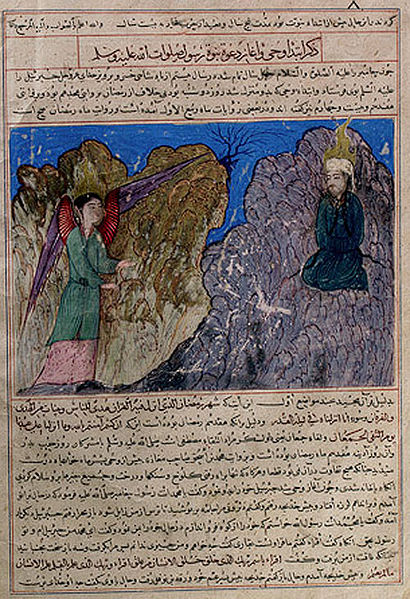B.W. Powe will be speaking at York University on October 21, 5-7 pm: “Apocalypse and Alchemy: Marshall McLuhan and Northrop Frye”
Monthly Archives: September 2010
Frye on Islam and the Koran
A page from the Koran, ca. 800
Further to an earlier post, Bob Denham has compiled a collection of quotes on Islam and the Koran which can be found in the Denham Library here.
Below is a selection on Judaism, Christianity and Islam:
[69] In my R.K. [Religious Knowledge] course is a clever & plausible remark about the Koran: suras arranged in order of length only means that if the Koran is the Word of God, God doesn’t give a damn about narrative sequence. Hence the rise of narrative literature and of causality structures (science) in the Christian culture founded on the Bible. There may be still something in this; but it may be balls too. After sura 1, an obvious opening invocation, sura 2 outlines the same old fall-exodus recapitulation, sura 3 adds Xy [Christianity] to it; sura 4 deals with points of law like Leviticus, and so on. It’s just possible that the length-order is the right one, moving from a sort of East Coker laying down of the law, in roughly continuous prose, toward a shower of lyrical apocalyptic sparks, charms, riddles, curses, etc. (Northrop Frye’s Notebooks on the Bible, CW 13, 85)
[310] Sex books in a bookshop are not there to tell you anything you don’t know; they’re there to keep your mind on the subject. Similarly with devotional literature, Christian & Marxist. Myths of concern [?]-clouds. This is an extension of the dissociation-by-repetition principle (95–6 on the Koran [par. 294]) that repetition charges the emotional batteries & suspends the critical faculties. What I tell you three times is true. What I tell you three hundred times is profoundly true. (Northrop Frye’s Notebooks on the Bible, CW 13, 198)
[349] Just as in the Bible we cannot distinguish the voice of God from the voice of the Deteronomic redactor, so in the Koran we cannot distinguish the voice of the angel Gabriel from the voice of Mohammed in a bad temper. (Northrop Frye’s Notebooks on the Bible, CW 13, 205)
[353] Resurrection, the opposite of rebirth, is the genuine form of reincarnation. In accepting incarnation Xy establishes the pattern of resurrection which (for instance) Islam doesn’t have. (Northrop Frye’s Notebooks on the Bible, CW 13, 206)
[22] Xy absorbed so much that Judaism (like Islam later) excluded. The internalized imagery of the ancient cave returned in the cathedral, whereas the Holy of Holies remained dark: the Mother returned in far greater force, along with the dying god: the totemic identification of human & animal victim is kept separate in the Akeda [binding of Isaac] and Passover: the blood sacrifice is similarly absorbed into the harvest-vintage ones. In short, there’s a real catholicity that gives it the resources of a world religion. It has the power to transcend itself: Judaism hasn’t. More accurately, and gratefully, it did transcend itself in the Christian Word & Spirit (NOT the Church). (Northrop Frye’s Notebooks on the Bible, CW 13, 370)
So the narrative unity of the Bible, which is there in spite of the miscellaneous nature of its content, was something that I stressed. And that concern for narrative seems to me to be distinctive of the Bible among other sacred books. In the Koran, for example, the revelations of Mohammed were gathered up after his death and arranged in order of length, which suggests that revelation in the Koran pays no attention to narrative continuity—that’s not what it is interested in. But the fact that the Bible is interested in it seems to be significant for the study of literature and for many other reasons. (“Symbolism of the Bible,” Northrop Frye’s Notebooks on the Bible, CW 13, 418)
The New Testament was written in Greek by writers whose native language probably was not Greek. The kind of Greek they wrote was called koine, the popular Greek which was distributed all through the Near Eastern countries as a kind of common language. The writers of the New Testament may have been familiar to differing degrees with the Hebrew text of the Old Testament, but when they quoted from the Old Testament they tended to use the Septuagint. And that is the beginning of a principle which is rather important for the history of Christianity. In any sacred book, there is enough concentration in the writing, and enough attention paid to it by those who accept it as sacred, for the linguistic characteristics of the original language to be of great importance. Any Jewish interpretation or commentary on the Hebrew Old Testament inevitably takes great care to study the linguistic nuances of the Hebrew original, and similarly with the Koran, which is so bound up with the linguistic characteristics of Arabic that in practice the Arabic language has had to go everywhere that the Islamic religion has gone. (“Symbolism of the Bible,” Northrop Frye’s Notebooks on the Bible, CW 13, 419)
The Exodus gives to the Biblical religions that curiously revolutionary quality which Judaism and Christianity and Islam all have to some degree: and we saw that a nation which has gone through that kind of revolutionary experience becomes a nation with a very strong sense of its own corporate unity because of the experience which its people have shared. Thus, law becomes really the antitype of the birth of Israel at the deliverance from Egypt, or the reality to which it points. (“Symbolism of the Bible,” Northrop Frye’s Notebooks on the Bible, CW 13, 584–5)
T.S. Eliot
httpv://www.youtube.com/watch?v=3tqK5zQlCDQ
Eliot reading “The Burial of the Dead” from The Waste Land
Today is T.S. Eliot‘s birthday (1888-1965). Eliot, besides being one of the primary poets of the age, was also the dominant literary critic in English when Frye was a young man, and had a unique position in Frye’s life and career. While Frye always admired the poetry, he regarded Eliot’s “reactionary” book After Strange Gods as a “betrayal” which made him aware of his “own responsibilities as a critic” (Northrop Frye in Conversation, 107).
Here’s Frye in his 1963 book, T.S. Eliot, on the poet’s anti-progressive view of history and his anti-Romantic view of literature:
The progressive view of history produced the post-Romantic conception of English literature which Eliot challenged. According to this, originality in poetry is an aspect of individual freedom in life; hence Shakespeare, who drew individuals so well, and Milton, a Protestant revolutionary, express the real genius of English literature. The era from Dryden to Johnson was an inferior and prosier age, but the Romantic movement re-established the main tradition, which continued in Britain through Tennyson and Swinburne, and in America through Whitman’s conception of poetry as self-expression.
Eliot’s historical view of English literature is a point-for-point reversal of the progressive one. The post-Romantic conception of “personality,” failing to distinguish the craftsman from the ordinary personality, assumes that the former is the medium or vehicle of the latter, instead of the other way around. In “Tradition and the Individual Talent” Eliot speaks of the poetic process as “impersonal,” not an expression of personality but an “escape” from it. The poet’s mind is a place where something happens to words, like a catalyser which accompanies but does not manipulate a chemical action. In other early essays, though Eliot agrees with Arnold about the immaturity of the Romantic poets, he means by “Romanticism” chiefly the popular post-Romantic residue of their influence which is contemporary with himself. This Romanticism, he says, “leads his disciples only back upon themselves.” Romanticism, then, as a creative process emanating from and returning from the ego, occupies the foreground of Eliot’s historical dialectic, the contemporary world at the bottom of the Western mountain, as far as we can get from the “anti-romantic,” “practical sense of realities” in Dante’s Vita nuova. (CW 29, 191)
William Faulkner
httpv://www.youtube.com/watch?v=fxM0C7zjoAc
Faulkner’s Nobel Prize speech. (Transcript here.)
Today is William Faulkner‘s birthday (1897-1962).
Frye in “Tradition and Change in the Theory of Criticism”:
[B]ecause literature is born of a specific culture and a specific locale, most great literature is intensely localized. I know of no great literature written about an empire, with the very dubious exception of Virgil’s Aeneid. William Faulkner, for example, is a great writer today not because he is a citizen of a great power or speaks one of the world’s major languages (although those factors are undoubtedly important for his reputation), but because he deals with a provincial and decaying civilization in Mississippi which most even of his fellow Americans know very little about. The writer has two centres of gravity: one in his own time and audience; the other in our time and in us. It is a mysterious but primary fact of literature that a poet remote from us in space and time and culture can still communicate his central vision to us, though we may admire him for reasons quite unintelligible to him or his age. Literature survives only by virtue of what is communicable across these barriers of culture. (CW 10, 250)
Levant and Libel
Libel suits are nothing new to Ezra Levant, who’s racked up a remarkable number of them in the last decade.
He’s currently shilling for a new book about the Alberta tar sands called (no joke) Ethical Oil, despite that fact that Alberta’s bitumen is the single most toxic source of oil mining in the world.
But that should come as no surprise. In 1994 Levant was in Washington D.C. for an internship funded by the Charles G. Koch Summer Fellow Progam. Charles Koch and his brother David own 84% of Koch Industries, an oil production conglomerate, and have pumped tens of millions of dollars into funding global warming denialism.
It’s thanks to the efforts of the Koch brothers that a lot of people think they can have an opinion on global warming (maybe yes, maybe no) — which is like having an opinion on gravity.
On Second Thought
I have decided to take down Ezra Levant’s column slandering George Soros. Since posting it this morning with the intent to expose the viciousness of the libel and the ugly way it is expressed in Levant’s September 5th Toronto Sun column, I have realized that it also makes the full text available to those who might wish to reproduce it in order to perpetuate the slander. I have therefore simply resorted to reporting the libel — the nature of which has long been in the public domain and has been refuted many times — in my own words. The revised post is here.
That said, I wish to emphasize just how wretched a thing that column is, as well as what it says about Levant and Sun News. You can read a very thorough account of the evolution of the slander with direct quotes from Levant’s column and what the public record reveals about his libelous claims here.
Out of curiosity, I called a lawyer friend of mine to ask about the legal status of reporting a libel verbatim with the obvious intention to contextualize it and fully expose its fraudulent nature — as well as bear witness to the kind of person who would perpetrate it in the first place. (I am especially curious to know because the column still circulates on the internet, which raises the question of being allowed to address the fact of the libel as it was expressed without any implied assertion of truthfulness about its fraudulent content.) My friend referred me to another lawyer specializing in libel law. I have put a call in to him and hope to report back on what he has to say about it soon.
In the meantime, I’ve kept a copy of Levant’s column for my files. Whenever I get complacent about what we’re dealing with here, I’ll pull it out and read it again.
TGIF: Chris Rock
httpv://www.youtube.com/watch?v=uj0mtxXEGE8
“How not to get your ass kicked by the police”
Video of the Day
httpv://www.youtube.com/watch?v=Di1LJbGEEtM
Stephen Colbert testified before Congress today on behalf of migrant workers.
Mark your calendar: just 36 days till Colbert’s “March to Keep Fear Alive.”
Margaret Atwood in the Toronto Sun
Atwood’s recent response to accusations by the Sun in the Sun here.
Money quote:
THE ACTUAL PETITION
“As concerned Canadians who deeply oppose American-style hate media on our airwaves, we applaud the CRTC’s refusal to allow a new “Fox News North” channel to be funded from our cable fees. We urge Mr. von Finckenstein to stay in his job and continue to stand up for Canada’s democratic traditions, and call on Prime Minister Harper to immediately stop all pressure on the CRTC on this matter.” THE VERBS ARE “APPLAUD,” “URGE,” AND “CALL ON;” NOT “BAN,” “SUPPRESS,” AND “CENSOR.”
The “Fox News” comparison is from the Sun’s own CRTC Application # 1. Is it “American-style hate media?” You judge.
The CRTC refused Sun TV News’ request for a special licence that forces all cable and satellite distributors to offer the station, thus generating almost automatic income. Application #2 — almost the same deal as #1, but for three years — will be considered. The Sun says it needs this special deal for its “business plan.” Should it get one? Should anyone? Can I have one too?
This last point goes to the heart of the matter. Why, just because Sun News has applied for the license, must it be granted one? Hell, I’d love one of those myself — like Sun News I could have a “business plan” which includes making millions of dollars. Why should I be refused? If I’m not owed it, why is Sun News? Particularly as they employ libel-spouting nincompoops like Ezra Levant.
Mohammed
Mohammed’s Call to Prophecy and the First Revelation; leaf from a copy of the Majmac al-tawarikhTimurid. From Herat, Afghanistan. In The Metropolitan Museum of Art, ca. 1425
On this date in 622 Mohammed completed his hijra from Mecca to Medina.
Frye in notebook 11f:
Still with the Koran: it’s a perfect example of my concern and imagination thesis. Mohammed was a very great inspired poet, but he found that this quality was precisely what made him distrusted. So he insisted that he wasn’t a poet but a prophet, & started brainwashing his followers with interminable repetitions of the just-you-wait type. Islamic culture, Sufi mysticism, geometrical art, mathematics & the like, descend from the suppressed poet; Islamic fanaticism descends from the paranoid prophet. Yet, human nature being what it is, there would never have been any Islamic culture without the brainwashing paranoia. Ugh. But I think we’re finding the moral equivalent of war [para. 78, p. 87] and the next thing to find is the moral equivalent of concerned paranoia. One element of this is counter-prophecy, of the sort Blake describes in his Watson-Paine notes. A prophecy that, without being facile or “optimistic,” points out the positive opportunities in each situation. (CW 13, 88)





